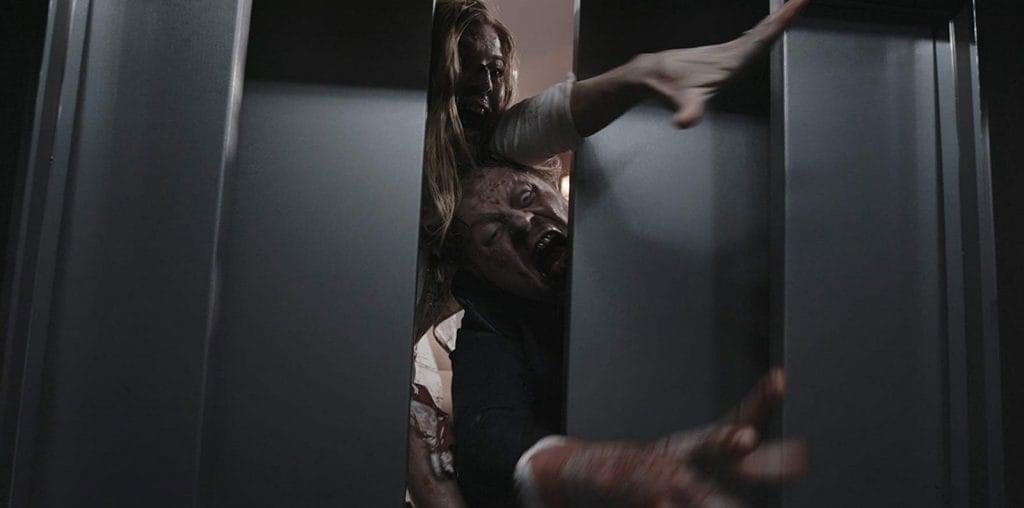
“Daybreak” is yet another riff on that classic, only-in-the-movies scenario of the nightmare alternate reality. First-time writer/director Michael James Kacey’s take on the theme is this: What if you woke up one morning and your entire life had magically transformed into what you’ve always dreamt it would be. Would it really be everything you’ve ever wished for? Or would it be a bad dream from which you could never wake? Sound familiar? If so, maybe that’s because it’s one of the most hackneyed plots in movie history, one that rarely transcends its high concept. There are few masterpieces of the genre, with Frank Capra’s “It’s A Wonderful Life” being the model for all others. Besides being among the greatest of all films, that film was a truly profound, yet simply told, examination of one man’s spiritual journey from the light into darkness and then back into the light. “Daybreak”, on the other hand, plays like an After-school Special version of The Family Man (the one with Nic Cage). Not exactly the edgiest material to water down as it is.
Based on Kacey’s short story The Dark Wish, the film centers on talented graphic novelist Jeff Stokes (Paul Clemens), who lives with his wife Michele (Debra Henri) and two stepsons in Los Angeles. Jeff is happy pursuing his life-long ambition of being an artist, but at the same time regrets not having married Michele right after high school. As fate would have it, Jeff went off to art school and Michele stayed home in Shamokin, PA and married a car mechanic named Walter (Ian Tomaschik), who then dies young in a tragic car accident. When Jeff and Michele eventually do get together, years later, life is just peachy until Jeff starts to feel like he’s inherited the leftovers of Walter’s life. To add to his despair, Michele can no longer bear children, due to an operation she underwent earlier in her life. This above all else, the need to procreate, drives Jeff to inadvertently strike a deal with, what else, a fallen angel. Conveniently, the fallen angel is a drunken homeless guy (aren’t they all?) who just so happens to be within earshot of Jeff, just as he’s bearing his soul. When Jeff wakes up the next morning, his life has turned upside down. He now has his own children (three boys) and the artist’s burning desire to create a “masterpiece” and thus achieve “immortality”, metaphorically through his offspring, has been fulfilled. Or some such hokum.
Of course we all know though, that Jeff’s new life, the life he had always wished for, will turn out to be anything but. The conventions of the genre dictate that Jeff’s new reality will more closely resemble something out of a rejected “Twilight Zone” plot than his perfect dream. I might have bought into this overtly movie-ish set-up, this being a movie after all, if the script wasn’t so predictable and the direction not as schlocky. Kacey plays the material shamefully straight, meanwhile nearly drowning this viewer in his syrupy soup of melodramatic muck. The script stoops so low in fact, that in this alternate reality, Jeff not only discovers that he is no longer an artist by trade (that would be far too simple), but that he is also a drunk, maybe having an affair, working in insurance (ouch!), AND abusive to his family! Yes, we get it! And if we didn’t, Jeff makes it quite clear, “This isn’t the life I wished for.” I grieve for the lost art of subtlety. The final nail in the coffin is the ending, which offers virtually no resolution and attempts a kind of bleak irony. That would be fine if it fit in with the tone of the rest of the film. Alas, by the end, the film has taken us nowhere but maybe down. Jeff hasn’t grown in any way, hasn’t learned anything about himself. Rather, he simply wallows in his existential despair, until all semblance of man and soul is lost. I’m all for downers, but only when they’re well earned. “Daybreak” offers nothing new to this weary genre and cheats its characters (and audience) of any real emotional depth.
